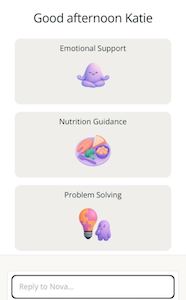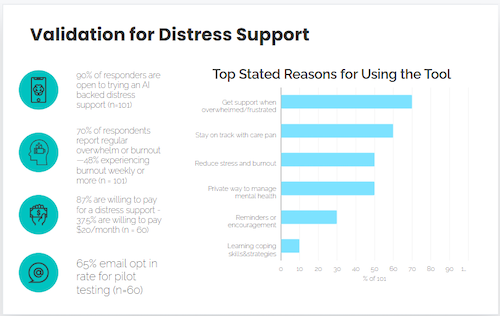Mun Health’s culturally attuned, AI-powered companion offers the daily emotional support often missing from traditional care.
When someone is diagnosed with a chronic condition, the medical checklist usually kicks in—tests, medications, referrals. What often gets missed is the mental load: confusion, isolation, shame, and the day-to-day stress of a new routine. Mun Health was built to close that gap.
When her mother was diagnosed with prediabetes, CU Denver alum Avani Bedagkar saw firsthand how a vital part of her care was being overlooked: Despite health care providers’ best intentions, the stress of navigating a new normal and her mother’s culture were not being addressed.
Her background in quality improvement for health care systems had shown Bedagkar that “emotional and mental well-being are often treated as secondary to physical health, even though they are the foundation of long-term wellness.”
Bedagkar says the seeds of the idea for Mun Health germinated while earning an Executive MBA in Health Administration at the University of Colorado Denver. Studying alongside physicians, nurses, dentists, and health care administrators in CU Denver’s hybrid program allowed Bedagkar to think outside the box. “Supportive faculty and classmates pushed me to connect empathy with strategy, helping me design solutions and interventions that make care more human, more connected, and more sustainable,” she said.
Jiban Khuntia, PhD, one of Bedagkar’s professors at CU Denver, says Mun Health “embodies the core values we aim to instill: patient empowerment, data-driven decision-making, and market-aligned design.”
The Gap in Care
Bedagkar points to four main challenges patients face when they are diagnosed with a chronic illness:
Navigating new, continuous self-management
Managing increased interaction with the health care system
Dealing with information overload, which leads to lack of clarity on how to execute a daily care plan.
Addressing the stigma and psychological distress that often accompany a new diagnosis
These challenges, combined with America’s current health care provider shortage leading to delays in care, can spell disaster for a lot of people as they rely on unhealthy coping mechanisms or go without the care they need.
According to Becker’s Hospital Review, patients often wait up to 38 days for an appointment. When patients newly diagnosed with chronic illness go without the support they need, they often experience complications which lead to the need for acute care or hospitalizations and greater costs.
Bedagkar knew there had to be a way to avoid these escalations by providing psychology-based, high frequency, low-cost touch points to patients with chronic illness. Meanwhile, Mun Health’s co-founder, Katie Trout, was thinking about the tech side of things. How could GenAI be used to create these high frequency, low-cost touch points?
Mun Health’s Nova Is an AI-Powered Disease Care Companion


Enter Mun Health’s first product, Nova. Nova is an AI-powered companion delivering evidence-based interventions that address the emotional, cognitive, and behavioral challenges of type 2 diabetes self-management. Nova also recognizes and incorporates cultural context to reduce stigma and reflect the social realities of living with a chronic condition.
For Bedagkar, who grew up in India, the cultural context was key. “In Indian culture, we don’t really talk about having an illness with our community members. We sit, isolated, with the stress.” With Nova, someone going through this stress on their own can have an outlet to share struggles, ask questions, and even keep their care plan all in one place for clarity and easy access—even if that care plan involves multiple providers at different locations. “Mun” means mind in Hindi and refers to the company’s goal to address the mental health care gap patients face.
Early Results
Nova is now available on Mun Health’s website, and Bedagkar and Trout are keeping the user top-of-mind by adjusting the web app based on feedback from patients and providers. Initial beta testing with Nova is positive, showing a 65 percent opt in rate among users who had a link to the web app emailed to them directly. While there are other support programs, such as Diabetes Self-Management Education and Support, referrals and completion rates for this and other options are much lower.
Now that Mun Health has been accepted into the Larta Institute’s Heal.LA 2025 cohort, next steps include launching a mobile version of Nova and developing products addressing other diseases, including type 1 diabetes, prediabetes, and gestational diabetes.
 Validation for Mun Health’s Nova Web App
Validation for Mun Health’s Nova Web App
###
Avani Bedagkar is a mission-driven health care leader with more than a decade of experience advancing quality improvement, population health, and value-based care across safety-net and public systems. She is currently chief executive officer and co-founder of Mun Health, an emerging GenAI startup building integrated, culturally attuned tools that address the emotional and psychological impact of chronic disease.
Bedagkar holds a Master of Public Health in Biostatistics and Epidemiology from the University of Southern California, an Executive MBA in Health Administration from the University of Colorado Denver, and a BS in Molecular Biology from UCLA. She is certified in mental health first aid, fluent in Spanish, Hindi, and Marathi, and has served as a suicide prevention and crisis counselor. She also sits on the Associate Board of the Exceptional Children’s Foundation in Los Angeles and practices Brazilian jiu jitsu. Across all her roles, Bedagkar remains focused on humanizing care through data-informed, culturally grounded, and emotionally intelligent health care innovation.
About the University of Colorado Denver
Millions of moments start at CU Denver, a place where innovation, research, and learning meet in the heart of a global city. We’re the state’s premier public urban research university with more than 100 in-demand, top ranked bachelor’s, master’s, and doctoral degree programs. We partner with diverse learners—at any stage of their life and career—for transformative educational experiences. Across seven schools and colleges, our leading faculty inspires and works alongside students to solve complex challenges and produce impactful creative work. As part of the state’s largest university system, CU Denver is a major contributor to the Colorado economy, with 2,000 employees and an annual economic impact of $665 million. To learn more about how CU Denver helps learners meet their moment, visit ucdenver.edu.
Media Contacts
